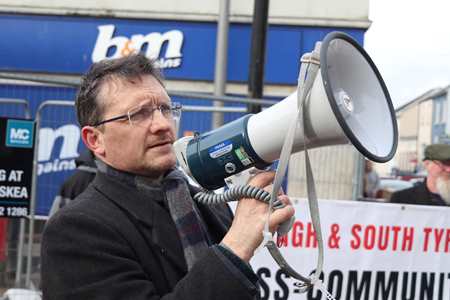
Sinn Féin, the Democratic Unionist Party (DUP) and the Alliance Party emerged as the main winners in the recent local government elections in Northern Ireland.
This shows a greater political polarisation taking place among nationalists and unionists in a society already dominated by sectarian politics. The so-called ‘moderate’ parties of unionism and nationalism, the Ulster Unionist Party (UUP) and the Social Democratic and Labour Party (SDLP), saw a further decline, ending up in fourth and fifth place. At the same time, the Alliance Party, which is viewed by many as moderate and neither nationalist nor unionist, won third place.
Sinn Féin was able to mobilise greater support by playing on widespread nationalist resentment at the continued DUP boycott of power-sharing. This has blocked Sinn Féin’s deputy leader, Michelle O’Neill, from becoming first minister.
Sinn Féin is now the largest party in local government, overtaking the DUP, and is the first nationalist party to hold the most council seats. The party secured control of six of the eleven councils. Overall, it won 39 more council seats than in the last election in 2019. Indicating its ability to win over more middle-class voters, Sinn Féin almost doubled its vote in Balmoral, a relatively well-off area of Belfast.
While the DUP’s stance on the Stormont Assembly drove many more nationalists to vote for Sinn Féin, it also consolidated the DUP’s support among unionists. Although second place behind Sinn Féin, as in last year’s elections to the Stormont Assembly, the DUP held all its 122 seats. Unlike in the Assembly elections, the DUP did not suffer big losses to the more hard-line Traditional Unionist Voice (TUV) party.
Going into the local elections, the DUP leadership maintained its opposition to the Irish Sea border and the Windsor Framework and refused to go back into the power-sharing Assembly. This meant the DUP was able to hold its own against the TUV’s appeal.
The DUP opposed the customs border in the Irish Sea that resulted after Brexit, regarding it as diminishing Northern Ireland’s place within the UK. The party says the Windsor Framework, which softens trading rules, does not go far enough.
The UK government is using a ‘carrot and stick’ approach towards the DUP. On the one hand, harsh budget sanctions have been introduced on the working class that will pressure the DUP to return to Stormont. On the other hand, the government are seeking to entice the DUP to re-enter Stormont by promising to “copper-fasten Northern Ireland’s place within the UK”. The DUP finds itself in a complicated balancing act between hardliners and working people who are really feeling the impact of sanctions. A section of the DUP may seek to drag out the party’s boycott of Stormont until after the summer ‘marching season’, which always raises sectarian tensions. Another section of the DUP appears prepared to return to power sooner rather than later.
In this highly polarised election, it was always going to be very difficult for smaller parties and independents, including those on the left. All of these forces were badly squeezed, with many losing their council seats.
Cross-Community Labour Alternative
Militant Left (CWI in Ireland) is part of the Cross-Community Labour Alternative (CCLA), which stood two candidates, Donal O’Cofaigh, in Enniskillen, and Gerry Cullen, in Dungannon. Both candidates have a long history of left activism and high public recognition in their areas. Standing for the first time in 22 years, Gerry scored a very credible 268 first preference votes (Northern Ireland has a single transferable vote system in local elections).
Donal was an outgoing CCLA councillor, with a tremendous four-year record as a socialist fighter on class, social and environmental issues. On the doorsteps, CCLA canvassers found a warm appreciation of Donal’s hard work on behalf of working-class people and especially regarding his leading role in the mass campaign against cuts to the South West Acute Hospital. However, the big squeeze from the main sectarian-based parties meant that Donal’s impressive 504 first preference votes were not enough to carry him through the necessary rounds to pick up the required transferable votes to retain his seat.
Donal and Gerry’s vote was also cut into by the false prophet of the Alliance Party. In recent years, Alliance has gained impressively, particularly amongst youth, by portraying itself as an anti-sectarian and ‘progressive’ alternative to the ‘Orange and Green dinosaurs’. But this largely middle-class party, which takes a neoliberal position on economic issues, will fail to solve any of the key problems facing working-class people and youth.
Many people in the Enniskillen area will be greatly disappointed that Donal, despite his outstanding role as a voice for working-class communities, was not returned to Fermanagh and Omagh District Council. But Donal’s votes, like those for Gerry, while relatively modest, indicate the basis for the continuing growth of class-based politics across the North. The broad alliance of left and community activists from Catholic and Protestant backgrounds that makes up CCLA can be confident they have the basis to make gains in the future, by participating in the social, economic and community struggles of the working class with bold class policies.
And the fortunes of the left will also be more favourable in future elections, as working-class people from both communities experience the results of the pro-market policies of Sinn Féin, the DUP and the Alliance Party in local government and a future restored Assembly Executive. Sinn Féin, for example, will find it very difficult to deliver even on its very limited social and economic policy commitments after the devastating cuts imposed by the Tory government in health (Northern Ireland has the longest waiting lists in the UK) and education, as well as other public services. Sinn Féin and the DUP have both shown in practice that they simply manage the system within the limited budget provided.
Militant Left will be fully involved in the process of developing working-class politics, while also building the forces of Marxism in the North and South of Ireland.
